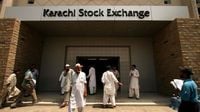Pakistan's financial markets faced a tumultuous week, marked by extreme volatility and geopolitical tensions following escalating conflicts with India. On Thursday, May 8, 2025, the Karachi Stock Exchange (KSE-100 index) experienced its largest single-day points drop in history, plummeting 6.7 percent amid fears of military confrontation. The dramatic sell-off ensued after reports emerged that Pakistan had downed 25 Indian drones that had intruded into its airspace, particularly over major cities like Karachi and Lahore.
In response to the steep decline, the Pakistan Stock Exchange (PSX) was forced to suspend trading for an hour after the index fell 6.3 percent in early trading. A notice from the exchange cited "unusual market activity" as the reason for the suspension. Adnan Sheikh, Head of Research at Pak Kuwait Investment Company, commented, "News of drones being downed in key cities such as Karachi and Lahore sent the market lower by over 6 percent in a matter of minutes, prompting a halt." This unprecedented downturn wiped out over Rs 820 billion in investor wealth.
Global markets reacted sharply to the situation, with Pakistan's international bonds also suffering. The 2036 maturity bonds dropped over 2 cents to trade at 72.4 cents on the dollar, according to Tradeweb data. Jim Reid, Global Head of Macro and Thematic Research at Deutsche Bank, noted, "The situation has raised fears about an escalation between the two countries, and it represents another example of how the Global South is likely to prove increasingly important for the global backdrop." This sentiment was echoed by investors as the benchmark index had already fallen 3.1 percent the previous day, signaling growing apprehension.
The geopolitical landscape further complicated economic concerns, particularly regarding Pakistan's ongoing negotiations with the International Monetary Fund (IMF). India’s Foreign Secretary Vikram Misri confirmed that India's Executive Director at the IMF would present New Delhi’s views during a crucial board meeting on Friday, where a $1.3 billion loan package for Pakistan is set to be reviewed. In a statement to Reuters, the IMF expressed its support for Pakistan's economic reform program and called for a "peaceful resolution and de-escalation between the two sides."
The situation took a different turn on Friday, May 9, 2025, as the KSE-100 index showed signs of recovery, rising 1.9 percent. By 10:10 AM IST, the index reached 105,467.7, an increase of 1,940.9 points. Market participants cautiously resumed trading following two days of substantial selling, triggered by the drone attacks in major urban centers.
Despite this modest rebound, the KSE-100 index had lost 9.5 percent of its value over the last four trading sessions, and since the Pahalgam terror attack on April 22, which resulted in 26 civilian casualties, the index had declined by 12.5 percent. The relationship between India and Pakistan has deteriorated significantly since the attack, prompting India to conduct missile strikes against terror-related facilities in Pakistan on May 7. This operation, named 'Operation Sindoor,' involved airstrikes targeting multiple locations, which India described as "precise and restrained" to avoid further escalation.
As tensions escalated, both countries ramped up their military readiness. On Thursday evening, Pakistan fired missiles directed at Jammu and Kashmir, resulting in widespread blackouts in northern Indian cities, including Amritsar and Chandigarh. An Indian Premier League match in Dharamshala was called off due to the heightened security concerns.
In a statement reflecting the dire economic situation, Pakistan’s Ministry of Economic Affairs appealed to international partners for additional loans, citing the heavy losses inflicted by the ongoing conflict. The ministry stated, "Govt of Pakistan appeals to International Partners for more loans after heavy losses inflicted by enemy. Amid escalating war and stocks crash, we urge international partners to help de-escalate." This appeal emphasizes the precarious economic position Pakistan finds itself in as it navigates the fallout from military confrontations.
Meanwhile, the Indian stock market also faced setbacks, with the BSE Sensex down 750 points, or 0.94 percent, and the NSE's Nifty 50 hovering at 24,041, down 230 points, or 0.96 percent. The volatility in the markets reflects the broader concerns about the escalating conflict and its potential impact on regional stability.
As the day progressed, the KSE-100 index continued to show signs of recovery, gaining over 800 points in early trade. However, the gains were trimmed, and the index ended up trading 1.2 percent higher as of 10:42 AM. The KSE-30 index also rose nearly 3.5 percent during the session, indicating a cautious optimism among investors in the face of ongoing geopolitical tensions.
The dramatic fluctuations in the Karachi Stock Exchange serve as a stark reminder of how quickly investor sentiment can shift in response to geopolitical events. With both India and Pakistan on high alert and military operations ongoing, market participants are left to wonder how long this volatility will persist and what the long-term implications will be for both economies.
In summary, the recent events surrounding the KSE-100 index highlight the intricate interplay between military tensions and financial markets in the region. As both nations grapple with the consequences of their actions, the global community watches closely, hoping for a resolution that can stabilize the situation and restore confidence in the markets.


